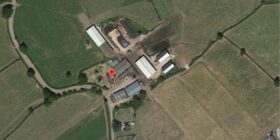Councillors Grill Health Board Chief – Agrees Waiting Times Are ‘Deplorable’

Councillors spent over two hours asking questions to the Chief Executive of the local health board, who gave an impression it was struggling to swim against a rising tide of problems let alone making progress.
In a special meeting of the Safeguarding, Communities and Wellbeing Scrutiny Committee representatives from Betsi Cadwaladr University Health Board (BCUHB) were quizzed over problems in and around the Wrexham area.
Chief Executive Gary Doherty, who was appointed to his position in February, offered some Yorkshirian style bluntness to his answers with Rob Smith BCUHB’s East Area Director also attending the meeting.
The committee had submitted some pre-written questions (PDF here which references this letter), with Mr Doherty opening the meeting with an overview of BCUHB’s current position in Special Measures.
Mr Doherty explained how BCUHB was working within a five key area framework of improvement, with various milestones in place from Welsh Government, the latest being reviewed in April and the next being in November.
Councillors were able to ask direct questions, with many quite blunt, Councillor I David Bithell asked Mr Doherty, “As Chief Executive why did you allow BCUHB to get into Special Measures on your watch?”
Mr Doherty replied saying he wanted to avoid ‘giving an answer that I am not taking responsibility’, but pointed out he only started his job in March (although the website notes it as February) and that the organisation was placed into Special Measures last year. Mr Doherty referenced earlier issues with the organisation, but said since his appointment work had been taking place, from recruiting new directors down to extra domestic staff and cleaning controls.
Councillor John Pritchard asked Mr Doherty that as it was now his responsibility how long does he think BCUHB would stay in Special Measures.
Mr Doherty replied, “It is not my call, it is up to the Welsh Government. You will all know the expectation they have, and Special Measures are not taken lightly. Two years has been mentioned starting from last summer, but I am hoping there could be some areas coming out before others rather than all in or all out. For us, it is about giving people the evidence to make the judgement, but it will certainly be two years but other areas before that.”
Councillor Rodney Skelland asked about changes in governance practices, pointing out in his view ‘everything falls into place if governance is sound’.
Mr Doherty observed, “A lot is governance, and a lot is quite a bit more than that. We have a lady who is working with us called Ann Lloyd who is chair of the commissioning body for whole of Wales, and is reviewing our governance. We have also been doing some work with the Audit Office on systems and processes. We have made some changes and the proof will be in the pudding on the decisions we make inside those processes. I think the changes we have made are to the good and will help us going forward.”
Councillor Bill Baldwin picked up on the ‘extra directors’ mentioned by Mr Doherty, saying “I am concerned you are taking on more directors, is that not more managers? There is a belief the NHS is full of tiers of management.”
Mr Doherty explained, “The two I mentioned are replacement posts, a Medical Director and Nurse Director. Both positions are a statutory requirement, and even if they were not statutory they are an absolute must.”
Questions from Councillor Phil Wynn revealed a £30m deficit, as he asked for an overview of the current state of affairs of health board’s finances.
The Chief Executive Mr Doherty replied, “We are forecasting a deficit of £30m, that is an underlying deficit. That £30m is after delivering a £30m cost improvement target, but we need to get into reoccurring balance.”
“Because we are in Special Measures we submitted a one year operational plan, but Special Measures needs a three to five year plan showing how we get into balance. For an organisation where we have significant challenges in the quality of service we have to be careful, we will not be putting savings in place that will impact adversely on services or staff.”
It was outlined the savings methods are focused currently around ‘bigger bulk buys’ and ‘more efficient in using resources’.
Councillor Wynn related a personal experience with the health service in terms of a long waiting list time, which Mr Doherty answered in terms of the financial backdrop of the previous question reiterating savings were not being made by cutting services.
Mr Doherty said, “It is cheaper to not provide a service than provide it, but we are providing services. In the first quarter of this year we are spending money with other providers in Chester or other places as we have not got that capacity. Our plan was to spend more money in the first quarter but we were not able to commission that capacity.
“We have tried to commission other providers, but that can be inconvenient as people have to travel further. We are trying to make the best of what we have got.”
Further detail was given on how last year for the same 36 week measurement period BCUHB treated 24,000 people and the comparable this year was 25,300 people.
Mr Doherty said “There is an increase in demand. We treat more patients every year, but add more to waiting lists and it gets worse.”
Referring to the issue raised by Phil Wynn as an example of a physiological process Mr Doherty pointed at strategies to ‘work with people and support them more, encourage to healthier lifestyle, as it can slow down the increase in demand.’
Mr Doherty made a final point saying, “On cancer targets we do very well. Life or limb threatening, we get them done. This is not much consolation for routine patients, and not to down play their pain, but we prioritise.”
Councillor Colin Powell was another councillor with a personal account of interactions with the health service, explaining how he was aware of a 8 year old with a broken arm waiting around 9 hours in Accident and Emergency before being seen, saying it was ‘unacceptable’. He said: “Wrexham is projected to increase around 11% demographically and that will have knock on effect as demand on local hospital. People have difficulty accessing their GP, and that will increase, the knock on affect is access to A&E, there is then an inherent problem to deal with problems in A&E behind the doors once inside.”
Mr Doherty acknowledged it as a ‘major major problem’ saying “it is far too long to wait in A&E for a broken arm.”
Explaining A&E as a ‘big complex relay race’ Mr Doherty told the meeting he believed there were alternative options where people going to their GP’s out of hours who could go to Chemists, “There are a range of people looking to get help and are not sure where to get it, and end up in the wrong place.”
Speaking of falls being another ‘major major problem’, he said: “Falls in the home for older people can be due to dehydration or confusion over medicines, and if we can reduce that we can reduce visits to A&E. We are working with nursing and residential homes as there are more beds outside the NHS than in the NHS.
“Outside of A&E there is a big big job, we will have to do hundreds of things in small way for improvement.”
Councillor Powell took this opportunity to ask the Chief Executive to pass back thanks and praise for the staff themselves saying, “The frustrations as a person attending in Wrexham is quite high
but once you get behind the doors, the quality of care, is excellent. It a compliment and credit to the staff, the staff themselves can’t do enough, and are kind considerate or whatever term you want to use. That has to be acknowledged, it is the system that is flawed.
Councillor I David Bithell took Mr Doherty to task again, describing waiting times as ‘deplorable’, and querying if the £30m deficit would impact on the standard of care provided.
Mr Doherty agreed with the comments over waiting times, but said financial issues ‘would not impact services’, adding “we had hoped to get 1,000 patients treated in England but we had not been able to do it. If I could have spent that money I would have been delighted, it would have made the financial position worse, but the service better.”
With Wales now making it an opt-out system for organ donation Councillor John Pritchard enquired if that had impacted on staffing levels, bed usage and also asked if the opt out figures were known.
Mr Doherty said he did not know how many people had exercised their right to opt out of the scheme, but said the impact was ‘very small’ in terms of staffing and resources. Explaining the process, and preemptively apologising for ‘using the terrible phrase harvest the organs’, he outlined how patients were stabilised locally with organs then moved to specialised transplant centres as the work is not done locally. He added, “In terms of delaying care or access to beds its negligible. When people are waiting for beds it is not due to this.”
Councillor Rodney Skelland gave anecdotal information to the meeting on how he had heard of private sector providers being used in England to help reduce waiting lists, however had not heard of such use in Wales.
Mr Doherty said: “We are not using the private sector in that way. I am not as aware of private facilities on the BCUHB patch. My understanding is any suitable capacity we could have used we would have used. We are sending patients to private units in North Wales to be done but I have not met any of the private providers in North Wales.
Councillor Dana Davies was next to quiz the BCUHB Chief Executive with three queries on organisational culture, finances and community hospitals.
Mr Doherty explained the ‘cultural change’ giving background to his prior role in Blackpool where a ‘Blackpool Way’ was introduced. A similar concept appears to be happening locally, however it does not as yet have a name. “It sets the example from the top, my priorities, how I behave. It is the values of the organisation, how it recruits and its behaviour, and cascade the training. A lot is common sense.
Councillor Davies said she was concerned a one year finance plan was restrictive, asking if it was ‘fire fighting’.
Referring to timed plans as ‘financial plan horizons’ Mr Doherty told the meeting: “We have financial projections for over a year. Even if we had a three to five year plan we would have elements of yearly and monthly refreshes.
“To have a plan together that gives us the system, quality and experience for staff and patients we want is not realistic before next financial year, but we have to have it before the one after that.”
Councillor Davies’ third point was asking if local medical centres feature in future strategies as there was talk of dealing with patients before hitting A&E.
Mr Doherty said he ‘preferred if people were looked after in their own home as much as possible, with trips to GP or chemists, to minimise visits to hospital.”
Speaking of the wider buildings of the BCUHB estate where newer buildings and revamps appear high on his agenda, he added: “We are spending millions on stripping out asbestos. Having looked at some of the estate, and spoken to Welsh Government, we will have to go back (to Welsh Government) with some quite big requests for funding. We have to make those convincing and compelling.
“I have seen some great facilities. There are, particularly in primary care, some big problems,
there will be a big ask in our 3 year plan.
Several Councillors asked questions over the areas GP’s and associated problems with both Rob Smith and Gary Doherty providing answers.
Councillor I David Bithell enquired about the recruitment and retention of GP’s in the area, asking if extended contracts could result in GPs staying in post longer and therefore building relationships with patients.
Rob Smith replied explaining how concern over the future of a practice could mean it is harder to recruit, and likewise if there is constructive and positive working things can be easier. He added, “It is not impossible to appoint GPs, we have made some appointments in last few months of good strong GPs”
Mr Smith did point out, “One thing I am getting used to in primary care is the lack of information provided and targets. In hospitals it is difficult enough, but we do see information. With primary care is not the case, we are starting to work closely with GPs to improve that.
“I don’t want to understate the challenges. Things are in place with two practices that have had difficulties, and we will then work with rest of the GPs to roll out that work to the rest of Wrexham.”
Councillor Brian Cameron was not convinced, saying he felt in the private pre-meeting he saw some light that ‘may turn into sunlight’, ‘but was not so sure now’. Councillor Cameron said he had hoped that the meeting would have given more detail on a strategy for the GP problems faced by Wrexham, however felt that things were dragging on and become very broad.
Rob Smith tried to placate Councillor Cameron, putting it down to ‘terminology’ over same words for plans, strategies and the like.
Councillor Cameron remained unconvinced, pointing out he had yet to hear the phrase ‘blue sky thinking’. He added he hoped it would not be a further three or four years to get plans up and running, “We need to know in Wrexham County Borough when we will be properly recruiting GPs, we seem to be going around and around. Yes we have had success with Hillcrest, but we still have a problem on the shortage of GPs. If we don’t attempt to solve that problem will put more pressure on other surgeries.
“Shortages of GPs is the biggest concern to people of Wrexham, there is an acute shortage. How many times have you been to this meeting and told us we are going to do this or that, and nothing happens?”
Mr Doherty said: “Plans, strategies, action plans, visions… whatever, my interpretation is it is a stock take of ‘what the hell we doing with estate’ in September, then recruitment is December time. What are we going to do? buildings and people before Christmas. If then what we are talking about is wider strategy, then that is a bigger piece of work and will take more time, if it is the specifics of buildings and GPs it is a pre-Christmas plan, certainly not 3-4 years.”
Mr Smith pointed out there was ongoing work with GPs, and none of that current work was reliant on plans later in the year, “I don’t want you to think talk of plan means its not an urgent priority.”
Councillor Carole O’Toole spoke about waiting times for GPs asking for research to take place where non-urgent waits are increasing, “I sense that it is as big a problem as emergency appointments”.
Mr Smith offered an example of a possible solution, “What we are aiming to do is dual processes that when patients ring up they are redirected to the right person, who may not be a GP. This reduces time pressure on the GP.
“One GP has developed a process where the GP themselves takes a call from someone who wants to see them on a day, 30% then don’t need appointment or go to A&E if they talk to a GP. The outcome is less pressure and work on the GP.”
Councillor Anne Evans was scathing, saying “I can’t see any improvement in GP services or hospital services since we have started. It is getting worse. You can have as many strategies as possible but we have ageing population with chronic conditions. I can tell you in certain surgeries you have to wait until appointments come online and its first come first served.
“We were told the best thing we can do is share out, not everyone has to see a GP and will see Practice Nurses, and now where are we? We can’t get to see a Practise Nurse. This level of crisis is creeping to the centre of the service, you can hardly get to see anyone.”
Inviting those from BCUHB to ‘go around and visit these surgeries in the morning’ to see the ‘frightening over subscription’, and the ‘standing room only’ A&E at weekends, she summed her views up by pointing at the papers provided in the meeting saying “None of this is relevant of a system that isn’t working, I can’t say this is an improving picture.”
Mr Doherty gave a mixed reply, reiterating that BCUHB was in Special Measures as ‘the service we are giving is not good enough’ but said, “At the risk of being felt to be minimising that failure, we are treating more patients than we have ever treated before. We are treating people today when that treatment did not exist or was not available five years ago. We have treated 1,000 more people versus the same period last year.
“Depending how you measure, we are getting better, and could argue it is. It is not enough. Is the glass full or half empty, or twice as big as needs to be? There are some signs we are making improvements.”
“There area challenges the NHS has never had before, people didn’t lead long enough lives 10 years ago to pick up some conditions. We have to raise our game and have a different approach to treating some people.”
“Patients to A&E and admitted to beds is far higher than it has ever been, amber calls (where ambulances are likely dispatched) are far higher in North Wales than rest of Wales and have gone up.”
“I don’t console myself with that, but nor do I think we have failed. The system is in many ways doing better, but not doing enough. I want the conversation in future to be a better one. It will be a conversation based on bigger demand. It is not my job to debate the higher demand, but to meet it.”
“The only plea I would make is with rising level demand, it is difficult to see progress and improvement, we have to make improvements bigger to cope.”
Rob Smith echoed that message saying, “I can understand the frustration over the years. Primary care has been at a low point but there was a lot of time and effort put in to sustaining services. I recogise services have not got better over last few years, it has been talking to GPs about continuing services rather than improvements”.
Wrexham is of course home to a new super prison HMP Berwyn, and the third of the prewritten questions was asking about the lack of partnership between Wrexham Council and BCUHB on the prison, and the wider impact the prison could have on the health and wellbeing of Wrexham.
The replies were somewhat stunted due to the meeting reaching the two hour point, a longer period of time than it seemed many expected.
Mr Doherty did respond with general points saying he was ‘no expert’ on the prison, however provided reassurance that a ‘general partnership’ was being worked on.
Councillor I David Bithell had no qualms on delaying Mr Doherty by asking further questions, specifically asking if the prison would impact on waiting times for local residents.
Mr Doherty referenced unspecified average benchmarks elsewhere, saying the prison needs would be ‘very small’ and “our plan there is that we will meet as many needs as we can inside the prison walls, so they would not have to come out”. Mr Doherty added, “We are very busy now recruiting to make that team and put it in place. What I would say is that there are people out there who can give you a better account of what type of post we are putting in place.”
Councillor I David Bithell asked a follow up query on if the prison would draw down further on already tight budgets, and if so would that impact on the people of Wrexham.
Mr Doherty said it would not be an issue as ‘we have been given extra money’.
Councillor I David Bithell was not happy with the imprecise answer, so probed further to enquire if the money given was sufficient to cover the extra costs.
Mr Doherty would not be drawn on a specific answer as mentioned a high cost need (neurosurgery) as an example that could not be forseen, but was confident in the position that costs would be covered. Although not much use if Wrexhamites are impacted, he did add “The proof will be in the pudding.”
Chair Councillor Rob Walsh invited Mr Doherty and BCUHB to provide a further update in January, specifically asking for a detailed plan and/or presentation on how services will perform and how all plans fit together. Councillor Walsh said he would like the focus of that update to be on community and primary care, the estates and GPs as ‘its an important issue that we get a lot of comment about’.
Councillor Colin Powell added to the invite discussion saying, “I get impression the response (from BCUHB) is we are carrying on what we are doing last 4-5 years and expect different outcomes. I would like you to come back to the next meeting and explain what is different from what has gone before, and what you expect to change.”
UPDATE: Back in February we looked at comparison information from HMP Northumberland and HMP Oakwood to predict the added demands to the local health services – you can read our full report here.
Spotted something? Got a story? Email [email protected]












